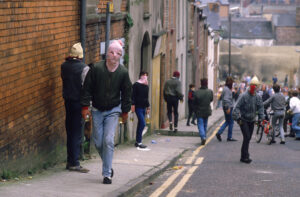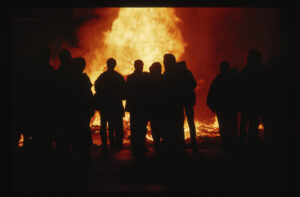For a spy, a job requiring furtive anonymity, James Bond always did have an unusual side-line in mass homicide. Apart from The Man with the Golden Gun, where Bond dispatches only the eponymous Scaramanga, his body count almost always hits double figures, peaking with 47 kills in the post-Cold War GoldenEye. Such brutality — and the cinematic thrills it supplies — is enabled by Bond’s “licence to kill”, a ruthless prerogative supposedly invested in him by the security services. Outside of the cinema, this could be regarded as an unrealistic fiction, the British public content that no government of theirs would allow its agents such discretion. Until last Friday that is, when it was revealed that — in the decidedly un-cinematic twilight of Eighties Belfast — a British spy had been operating with almost exactly this authorisation.
Last week, the Police Service of Northern Ireland (PSNI) released its long-awaited report from Operation Kenova, a seven-year criminal investigation costing £38 million, into the activities of a British Army agent known in the media as “Stakeknife”. Rumours about this agent first surfaced at around the time of the Good Friday Agreement, in 1998. Stakeknife was said to be Freddie Scappaticci, a bricklayer from Belfast who was recruited by the army in the late Seventies. It was claimed that his intelligence had saved “countless” lives, even if it came at a terrible price.
The chilling allegation against Freddie Scappaticci was that during his time as an army agent he became a senior figure in the IRA’s infamous “Nutting Squad” (to “nut”, in Northern Ireland, is to shoot someone in the head). Part of Scappaticci’s job had been to find spies in the IRA and interrogate them, in other words hunting down people like him. If the Nutting Squad extracted a confession from a suspected agent, a recording was sent to the IRA Army Council where the likes of Martin McGuinness would decide if the victim was to live or die. Usually, Scappaticci recalled, the order that came back was: “take him out and give him it”. Newspaper reports suggested that Scappaticci might have been involved in as many as 50 murders. In itself, this was shocking. Far more disturbing was the idea that his army handlers knew about this and may have been complicit.
Operation Kenova was set up in 2016 to investigate the claims about Scappaticci and, if true, build a criminal case against him and his handlers. It was hoped that this would provide justice for the families of those who had been abducted and murdered by the Nutting Squad. Over the next seven years, a team of 72 detectives conducted 336 interviews, and went through more than 12,000 classified records from the archives of the local police, the army and MI5, in what will ultimately go down as the largest murder investigation in British history. But it led to no criminal prosecutions. That’s mainly because its principal target, Freddie Scappaticci, died before final charging decisions could be reached. The man leading Operation Kenova, Jon Boutcher, recently appointed Chief Constable of the PSNI, accepted that his investigation had failed to deliver justice. But he was adamant that it could still remedy the historical record, and provide lessons for future British governments.
The Operation Kenova report published last week was clear and uncompromising. On too many occasions, Boutcher wrote, Scappaticci’s handlers turned a blind eye to their agent’s horrific crimes. Some of these handlers, when questioned by Boutcher’s detectives, argued that Scappaticci’s intelligence had allowed them to save “hundreds” of lives. Boutcher strongly disagreed. After going through most of the written reports attributed to Stakeknife, he estimated that this intelligence saved no more than about 10 lives. Although his team did not find any direct evidence of Scappaticci taking someone’s life, they estimated that he was personally involved in as many as 14 killings. Based on this, Boutcher estimated that more lives were lost as a result of Stakeknife than were saved, a catastrophic inversion of the moral trolley problem that his handlers had been playing with real lives in Northern Ireland.
What’s interesting about this conclusion is that Boutcher did not criticise the initial decision to recruit Scappaticci. Nor did he state that this agent should have been dropped as soon as he joined the Nutting Squad. Instead, Boutcher argued this was a question of degree: that Scappaticci had been allowed to go too far and that his handlers had failed to provide rigorous oversight. And they did this because Stakeknife was a prize asset. The ultimate goal for anyone in the business of running spies is to recruit an enemy official as an agent. That’s been the case since the dawn of espionage, and it was true in Northern Ireland. Britain wanted agents deep inside the IRA, and would sacrifice at least some principles to get them there. But this wasn’t following some existing law, nor are there other well-known examples of agents from MI5 or MI6 being free to kill with impunity. And that’s why the Stakeknife story should make us fundamentally confront what it means for Britain’s operatives to pose as members of violent extremist organisations.
In Britain, we have historically maintained a respectful epistemological distance from our intelligence agencies. “Secrecy”, the historian Peter Hennessy wrote, “is as much a part of the English landscape as the Cotswolds.” As recently as the late Eighties, we indulged the idea that MI5 did not officially exist — during the Sixties, MI6’s headquarters still displayed a plaque saying it was the “Minimax Fire Extinguisher Company”. When it comes to the secret world, we have a history of looking the other way.
During the Troubles, this laissez-faire stance bled into the way that agents like Stakeknife were run. When a senior Special Branch officer went to Margaret Thatcher in 1986 and told her that a worrying number of police informants in Northern Ireland were taking part in serious crimes, the response from Downing Street was clear: “Please continue to do what you’re doing. But for goodness’ sake, try not to get caught.” This attitude percolated down from the top, until it reached the men and women looking after the likes of Scappaticci. It was in the background as they tried to figure out what to do with the intelligence he was supplying. Each time he told them about a forthcoming attack, or a murder that was being planned, they faced a dilemma: will we save more lives if we act on this intelligence, or if we don’t?
The same real-life game theory was applied during the Second World War by government officials in Bletchley Park. They knew that if they acted on everything, the Germans would work out that their encrypted Enigma messages were being read and change their codes. As a result, there were times when the British chose not to intervene in order to save more lives in the long run. In a very similar sense, Scappaticci’s handlers often chose not to act, hoping that protecting their source would ultimately allow them to save more lives. But according to Jon Boutcher, they frequently made the wrong call, and should have intervened many more times than they actually did. And part of the problem, Boutcher suggested, was that those in the intelligence community had “a tendency to view the Stakeknife case through rose-tinted spectacles”. They were beguiled, he felt, by the mythology surrounding this agent, and the “irony” and “poetic justice” of having a spy inside the IRA’s spy-hunting unit. Maybe they also believed that nobody was ever going to rake over the details of what they were doing, which would help to explain why they were willing to give Scappaticci what was, in all but name, a licence to kill.
It’s rare for a police investigation to lead to new legislation, but the Stakeknife case was the driving force behind the government’s 2020 Covert Human Intelligence Sources (Criminal Conduct) Bill. Never before had Parliament debated whether government agents should be allowed to take part in murder. But Operation Kenova had shown that the law on agent-running was woefully inadequate. This new bill would clear up just how far government agents could go. Some politicians called for an upper limit on agent criminality, and hoped that this bill would make it impossible for spies to participate in serious crimes including sexual violence, murder and torture. No amount of intelligence, they argued, could ever justify murder.
But the government — or rather the intelligence agencies — disagreed. Their argument was that by allowing some crimes, and not others, it might be possible for a terrorist leader to identify any spies in their group by asking them to carry out a proscribed activity. Anyone who refused would come under suspicion. As a result, the final draft of this unprecedented legislation, described in The Guardian as “shameful”, had no upper limit on agent criminality. It became known as the “licence to kill bill” before it had even passed.
On the face of it, this new law is deeply troubling. MI5, MI6, the police, and a surprisingly long list of other government agencies now have the power to authorise their agents to commit serious crimes. But look at the detail of the legislation, and you can see that a situation like the one in which Freddie Scappaticci found himself, when he came to believe that he had a licence to kill and could freely take part in as many IRA killings as he saw fit, is unlikely ever to happen again. The new law is by no means perfect, though it has introduced a system of checks and balances that were not there during the Troubles in Northern Ireland. But ultimately it only relitigates one of the central ethical dilemmas of liberal society: how much harm do we permit the security services to inflict in order to keep us safe?
Disclaimer
Some of the posts we share are controversial and we do not necessarily agree with them in the whole extend. Sometimes we agree with the content or part of it but we do not agree with the narration or language. Nevertheless we find them somehow interesting, valuable and/or informative or we share them, because we strongly believe in freedom of speech, free press and journalism. We strongly encourage you to have a critical approach to all the content, do your own research and analysis to build your own opinion.
We would be glad to have your feedback.
Source: UnHerd Read the original article here: https://unherd.com/



